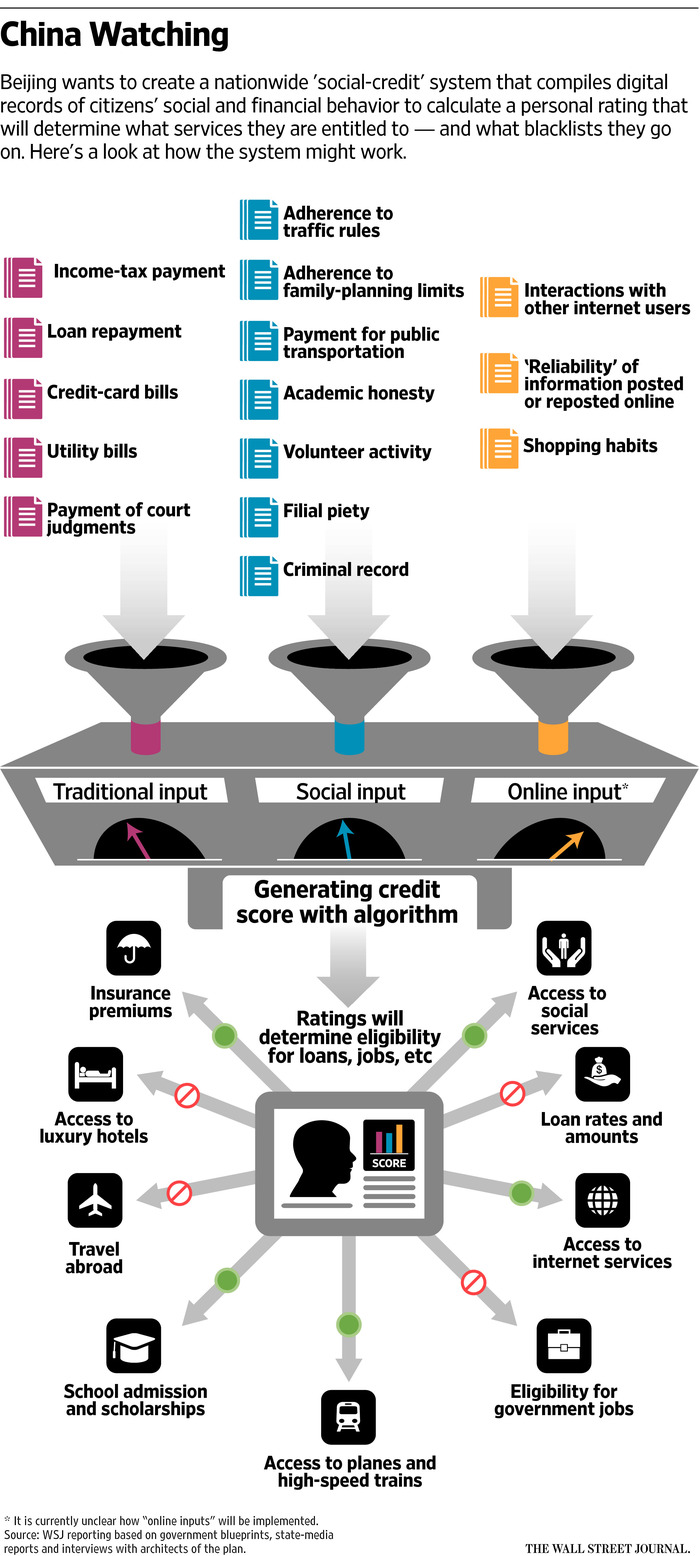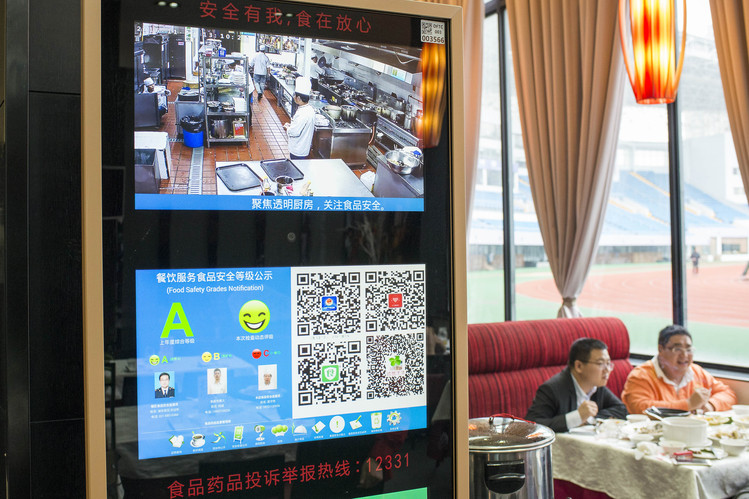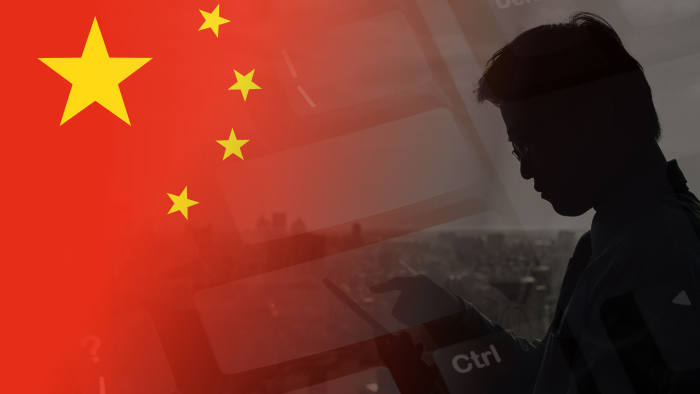China turns big data into "Big Brother"

Fragment of a popular reality show
Chinese authorities plan to introduce a system of assessing citizens according to their degree of reliability. Each person will be assigned a rating, on which his life will completely depend. This applies to everything - from education to bank loans.
This is not just a design concept. Most of the ideas described above have already been implemented and are being tested in the work by the authorities “on the ground”. Currently, in some regions of the country, a system is being tested that allows you to create digital records of citizens. Each entry (questionnaire) will record details of the citizen’s social life and its financial activities.
On this basis, a “reliability rating” will be formed , which will determine for any Chinese an opportunity to get access to certain services, including travel, education, insurance, and loans. Probably, some categories of citizens will be more closely monitored. These categories include lawyers and journalists.
')
As an example of how all this will work, you can take the usual case in the subway. For example, a woman tries to go to the subway with a student card of her son, which costs two times less than a regular ticket. She is caught by the police and fined for a certain amount. In addition to the fine, she also receives some assessment that affects her overall reliability rating. A few more such acts, and she will not be able, for example, to fly to another country - they simply will not sell her a ticket.
Of course, you can lose the “social” rating not only because of attempts to deceive the system of passes in the subway. This applies to everything - asocial behavior, attempts to deceive the tax inspector, violations of family planning rules.
Over the system works as the leadership of the country, and the leadership of more than 30 regions of China. And the work is really ambitious, because to create a system capable of tracking 1.4 billion people can not be simple by default. Sticks in the wheels when creating a digital "big brother" are inserted by local officials, who resist database unification, not wanting to open information on their region to the central government. Therefore, the introduction of a system of monitoring of Chinese citizens to work in the near future is questionable. But no one says that monitoring will be carried out as early as next month.
“Whether we will be able to implement this project or not is still unclear, we are in a state of uncertainty. In any case, this is better than what has worked all previous years, when we had no data [about citizens - approx. ed.], and the police judged people based on information received from other people, ”said Meng Tingguang, a political scientist at Tsinghua University .

The principle of operation of the system described in the material. According to the plan, everything should work like this.
The administration of Shanghai has published on its web page a few details about the citizen monitoring system in its region. In particular, it is confirmed that violations of the law will affect the reliability rating. Among the misdemeanors - the failure of the timing of payment of fines and violation of traffic rules. Obtaining “points of unreliability” will lead to an increase in the number of conditions for obtaining a loan at a bank or altogether refusing bank credits. In some cases we are talking about the inability to get a discount on the services of any companies.
The system, which is being developed in Shanghai, is still in an early stage of its development. Locals have the opportunity to view their data, this can be done on a special resource. So far, according to The Wall Street Journal journalists , there is no information on this resource that would not apply to the financial aspects of citizens' lives. That is, it is not yet possible to find out about social offenses and violations of any rules.
For a person with a psychology shaped by Western culture, all this may seem terrible. But the psychology and behavioral characteristics of the inhabitants of Asian countries are significantly different from Western standards. So, the results of the research of Young Wang, a researcher from Syracuse University, show that the Chinese are not too concerned about such a problem as the protection of personal information in the network. The most common term in this country, denoting the right to privacy, appeared in China only in the mid-90s.
By the way, blacklists of unreliable citizens have long existed in Celestial Empire. For example, one of the citizens of China cannot buy tickets for airplanes or high-speed trains, because once he lost in court to his landlord. By introducing a digital monitoring system, assessing the reliability of citizens will be much more effective. Authorities and commercial structures will be able to close access to a large number of services and opportunities for “punished” citizens.
Experts involved in the project believe that in order to introduce such a system into China, it is necessary to go a long way on which a number of problems will await developers. One of them is the need to work with accurate data in order to avoid committing a large number of automatic errors. So far, according to some experts, "garbage at the entrance, garbage at the exit."
Positive points
Yangjing City has its own citizen rating system. Here it is based on the opinions of neighbors and local communal committees about a person.
From the middle of 2015, the “red lists” of the best residents are published in this city. Moreover, the citizens themselves often do not understand why they are included in such lists. There are also “gray lists”. In which include those residents who commit violations. For example, throwing garbage in the window. True, the decision on whether to publish such lists, the local house management has not yet taken.
While about 170,000 people live in the settlement itself (by the standards of China, this is a deaf village), only 120 people have yet fallen into the list of trustworthy citizens. The administration of the settlement complains that officials are prevented from assessing restrictions on people’s access to personal data of residents.
Monitored and business representatives of any size. The purpose of the system is not only to collect data on citizens, but also to monitor entrepreneurs in order to analyze data about them and provide such data to customers of companies.
One of the reasons is the authorities' intention to ensure the supply of safe food. This is one of the most important problems for China since the time when six young children died due to a poisonous component in milk powder, which was sold in several stores in China in 2008. After that, it became known that there was a useless oil in restaurants, then about the sale of low-quality fuel, etc. The Chinese authorities, as well as the residents, are trying to fight companies that use similar methods in their work.
In the same Yangtsin, the authorities ordered the installation of surveillance cameras and screens in catering facilities. The cameras show visitors the cuisines of restaurants and cafes, and people can be convinced that they don't allow themselves unsuitable chefs. Of course, you will not follow every ingredient used in cooking, but cooks do not feel as free as usual.

Diners can see the kitchen, links to the restaurant's web page, as well as the rating of the establishment, plus a list of people responsible for the restaurant and the quality of the food prepared in it.
The rating of the establishment formed by the monitoring system is also displayed on the same screen. There are, however, errors. For example, one of the vegan restaurants, according to his leadership, got into antirating by accident, due to an error. After that, the display was half closed with a poster, because the authorities were unable to remedy the situation, even realizing that this was a mistake. Well, a demonstration of a low rating of an institution may scare away customers, therefore, in a restaurant, they did the same.
Information about the financial life of citizens is collected by the authorities at state organizations, such as the tax inspectorate. In addition, some of the information is provided by Chinese online stores and telecommunications companies (for example, Alibaba Group Holding).
And business too
Eight major Chinese companies agreed to take part in a government rating experiment. In this case, we are talking about a credit rating, which is based, inter alia, on the information that and when a person buys, as well as what phone he has. If the client agrees, information about the level of education and other data can also be used.
“In particular, all this is important for young people whose behavior on the network, among other things, influences their credit profile. We want young people to understand that they need to behave better, ”says Joe Tsai, one of the leaders of Alibaba.
The holding shares information about online purchases with the state statistical agency of China. But personal data of individual citizens are not disclosed. This is done only if requested by the government. And now it is not clear whether the systems that collect public and private data of citizens of the country will be combined. Most likely, yes, because back in October, Jack Ma, the head of Alibaba, called on a government official to use data from the network to identify criminals. True, he did not say directly that Alibaba will disclose the data of its customers and users, but you can guess about it. Representatives of the company at the request for clarification of the situation with the proposal of Ma said that it was a machine learning and in-depth analysis of data to identify criminals.
In November, government officials complained to China’s official media that a large amount of citizens ’information is on“ islands, ”that is, some databases are isolated, and it can be extremely difficult to obtain such information for use in a central monitoring system. The credit history of 640 million Chinese citizens from 37 regions has already been collected. Officials are hoping to collect even more data from the databases of customers of China’s telecommunications companies. Information from phones, smart watches and other devices of users can be extremely useful in this matter. In general, it all looks like the North Korean Sonbun , only modernized, in digital form.

The test work of the system revealed unreliable people, criminals who were forbidden to buy tickets for airplanes and high-speed trains. The "black list" got 4.9 million people.
At the same time, government advisers, among whom Meng Tinguang, mentioned above, are not at all sure that a centralized monitoring system for all Chinese citizens can be launched at least in 2020 - there will be too extensive work. During the implementation of the project, it will be necessary to overcome many problems, both explicit and not so.
But in general, the direction of development of this system is set by the Chairman of the People’s Republic of China, Xi Jinping, who repeatedly spoke of the need to establish a system of social control and increase the general level of citizens' morality.
Source: https://habr.com/ru/post/372929/
All Articles